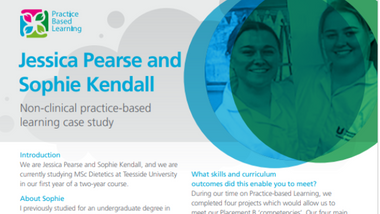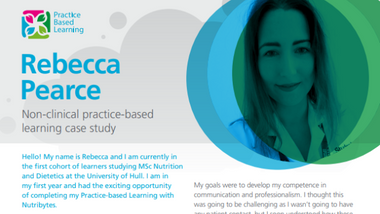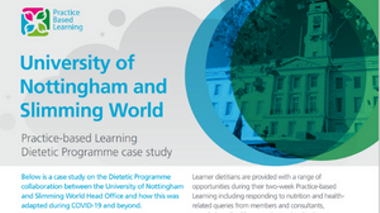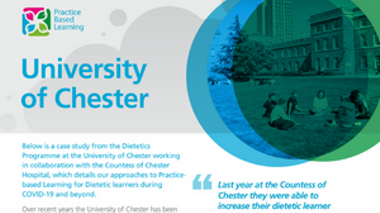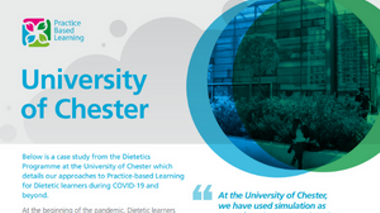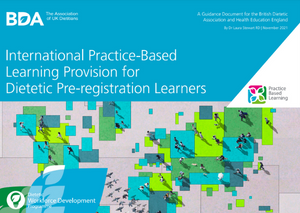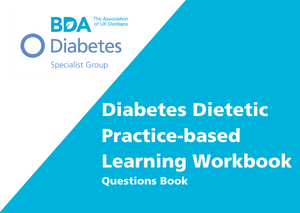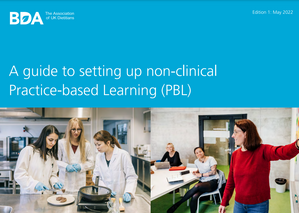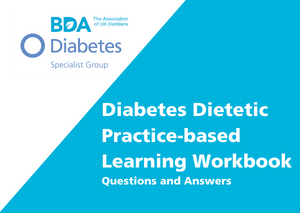Practice-Based Learning
Dietitians have a vital role to play in the public health agenda, with responsibility in providing dietary advice and policy in a cost effective manner, to improve the lives of communities and populations across the UK. It is imperative that the profession retains and increases its presence and expertise within this arena. Not only is it important for students to be equipped with the necessary skills and sector understanding to enable them to work across both traditional and emerging /developing environments, but extending the breadth of placements also increases capacity and releases pressure on NHS departments which may be struggling to cope with the demands placed upon them.
The traditional method of placement education places dietitians in the hospital or community setting to experience a dietitian’s role. Although there is a large majority of dietitians that do work in this environment, there are many dietitians who work in other varied and successful aspects of diet and nutrition.
Length of Placements
Students are required to complete 1000 hours of placement time, with at least one placement consisting of 350 hours in the final year of placement.
Placements do not need to be conducted in a single location. The traditional format of placements (a student working within the acute setting and some within the community) is increasingly being adapted to provide students with experience in other sectors including industry, social care, third sector and public health. Incorporating these new sectors works to increase student knowledge and can reduce pressure on departments.
Placements are organised by the University liaising with healthcare trusts and industry. They allow the student to have hands on experience to develop practical skills and apply their knowledge in a supervised work environment. The placements are usually full time and the usual working hours of the department.
Delivery of Placements
The traditional model of practice placement delivery has historically been one dietitian to one student, although a number of different team members might be involved in delivery of the overall placement. This structure reflects the nature of the work of the qualified dietitian within the NHS, who will, on the whole, manage their own individual caseload. However, whilst valid, this model is neither sustainable nor necessarily cost or resource efficient for all elements of the pre-registration programme.
The BDA welcomes a variety of practice placement delivery styles, mechanisms and settings. These are discussed in the Practice Education Module, along with practical methods of implementing effective teaching methods to placement students.
Practice education provides opportunities for staff development and CPD within the dietetic department. It also allows the current working population to influence the skills and numbers of future colleagues. All student supervisors should take an active role from participation to development of practice education programmes.
- To meet Practice Education needs, it is required that there will be strong collaboration between the higher education institutions and service providers, both within and outside the NHS.
- The BDA has a role to play in raising the profile of dietetics and student dietitians within NHS environments and beyond. Equally, there is a need for dietetic managers / recruiters of dietitians within the NHS to recognise the added value to the service in students having undertaken a broad range of placements. It is important that as a profession, dietitians recognise the abilities and employability of those graduates who bring a wealth of transferable skills and experiences.
- Alternative models of practice education delivery should be trialled and findings disseminated across the profession. Examples of such activity might include peer learning models, virtual learning environments and inter-professional learning opportunities.
- Practice education models should prepare the dietetic student body for the future requirements of the profession, with strong evaluation of impending workforce demands and education tailored to meet career opportunities and delivery needs, including acute and community NHS settings, public health and social care. In addition, private sector opportunities should be explored.
The requirements of the Health and Social Care professions Council can be practiced, demonstrated, and met in lots of different settings. The skills and behaviours learnt at university can be applied in all areas described here.
National Health Service
Clinical
Private Healthcare & Prisons
Students can help develop and support nutritional care and guidance in the following areas:
- Catering
- Providing advice for specific conditions
- Allergies
- Health promotion
Public Health Teams
Students can support or develop the following areas:
- Interpret nutritional needs
- Develop training
- Interventions
- Resources
- Health promotion
- Health at work
- Population engagement
- Menu reformulation
- Exploring local food availability at restaurant and take away etc
- Food mapping
- Cook and taste events
- Catering
- Lunch boxes
- Evaluation
- Data for a pitch
- Collaborative working to understand how health care and local services and voluntary services link up
- Marketing communication
- School start breakfast/lunch boxes - dispelling myths and misunderstanding
- Breakfast clubs
Social Care
Student dietitians can:
- Care homes
- Day centres
- Home visits (integrated car teams) carfares
Provide support, guidance or developing nutritional guidance and awareness around
- Catering
- Communication
- Monitoring food and fluid charts and residents intake
- Conducting audits on nutritional intake - to ensure individuals are meeting their needs
- Malnutrition Universal Screening Tool (MUST) - exploring screening to improve nutritional care
- Inter-professional learning opportunities
- Dementia • Carers support group - providing education
- Community meals - audit
- Developing educational material
- Group education of staff
- Vanguard (nutritional projects)
- STP’s sustainable transformation plans (STP’s)
- Training community pharmacists
- Developing nutritional tools
Industry & Charities
Student dietitians can:
- Answer customer queries
- Update or review product information looking at the latest evidence
- Help support care lines
- Develop resources for the general public or health care professionals
- Help with product evaluation
- Help manage audits
- Help deliver focus groups
- Help with quality improvement projects
- Develop interventions
- Undertake service evaluation
- Carry out literature searches
- Manage health promotion events and health promotion stands
- Manage health and wellbeing stalls
Supermarkets
Student dietitians can:
- Offer supermarket tours to members of the general public for the following specific conditions:
- Diabetes
- Coeliac disease
- Food allergies
- Dairy/wheat intolerance
- Understanding and reading food labels
- Run health promotion stands in the store or in staff canteens
- Review nutritional information leaflets for the general public
Have you considered supporting a student dietitian on placement? Does your team need an enthusiastic student dietitian who can support your team with key projects, for example the provision of nutritional advice, research or patient information materials?
Could you offer a ‘Complementary Placement?’
A complementary placement is designed to build and strengthen core practical skills that dietetic students are required to develop outside of the classroom. These transferable, ‘hands-on’ skills enable students to become flexible competent practitioners, fit for practice in an ever-changing work environment. In particular, these placements allow students to develop their communication, self-confidence and professionalism skills whilst also extending their knowledge and skill base.
What skills do dietetic students have?
Dietetic students work within a strict code of professional practice and are regulated by Health and Care Professions Council (HCPC). This provides a code of professional practice. In addition, student dietitians have a range of skills to offer, can be excellent communicators, and will be able to work independently, with guidance or in teams. They have should have a good working knowledge of nutrition and are able to access and critique the evidence base around nutritional advice.
As part of our Dietetic Workforce Development Programme, we’re developing a number of resources for learners who will be going on Practice-based Learning as well as those working in HEIs or non-clinical environments who may be setting up Practice-based Learning.
Check out some of our new resources below, including Q&As with learners that have gone on non-clinical Practice-based Learning. Hear their experiences and how it enriched their studies and development towards becoming Registered Dietitians.
If you're an educator wanting to know more about Practice-based Learning clinical and non-clinical settings then take a look at our brand new eductor case studies below.
We’ve also developed an International Practice-based Learning Provision for Dietetic Pre-registration Learners. This document discusses the process of taking part in International Practice-based Learning and what needs to be taken into consideration, including funding, care and support and learning types.
Alongside these documents we’ve also developed a guide aimed at Registered Dietitians working in non-clinical dietetic work settings as well as Higher Education Institutes providing dietetic training courses for setting up non-clinical Practice-based Learning. See the guide.
Learner Case Studies
Educator Case Studies
Key Messages
Practice education provides opportunities for staff development and CPD within the dietetic department, in addition to, allowing the current working population to influence the skills and numbers of future colleagues. Therefore, all student supervisors should take an active role from participation to development of practice education programmes.
-
To meet Practice Education needs, it is required that there will be strong collaboration between the higher education institutions and service providers, both within and outside the NHS.
-
The BDA has a role to play from a UK perspective in raising the profile of dietetics and student dietitians within and beyond NHS environments. Equally, there is a need for dietetic managers / recruiters of dietitians within the NHS to recognise the added value to the service in students having undertaken a broad range of practice-based learning. It is important that as a profession, dietitians have faith in the abilities and employability of those graduates who bring a wealth of transferable skills and experiences.
-
Alternative models of practice education delivery should be trialled and findings disseminated across the profession. Examples of such activity might include peer learning models, virtual learning environments and inter-professional learning opportunities.
-
Practice education models should prepare the dietetic student body for the future requirements of the profession, with strong evaluation of impending workforce demands and education tailored to meet career opportunities and delivery needs, including acute and community NHS settings, public health and social care. In addition, private sector opportunities should be explored


